by Jenny Rose | Dec 13, 2018 | Emotional Intelligence
My partner and I have been watching Lie To Me, a television series that ran on Fox from 2009 to 2011. The show is based on the work of Dr. Paul Ekman, the world’s greatest expert on facial expression.

Photo by Milada Vigerova on Unsplash
I am absolutely fascinated.
All my life I’ve been extremely aware of body language and what I’ve always called the “energy” of the people around me. I’ve frequently had the experience of picking up the hidden emotions of others and taking on responsibility for them, a result of ineffective boundaries. When I was trained in emotional intelligence I cleaned up my poor boundaries and many other destructive habits. I also began to openly and unapologetically trust myself after a lifetime of cognitive dissonance caused by the difference between words and nonverbal cues from others.
Now, at last, I have real world validation for the way I can sometimes “read” others. It’s not magic, and I’m not a freak, a fantasist or crazy. Science now recognizes the universality of human facial expressions for basic emotions (fear, surprise, contempt, happiness, sadness, disgust, shame), and technology allows us to slow down video footage and capture microexpressions, which occur in much less than a second, as we speak and interact with others.
Our words can lie, but Dr. Ekman’s work reveals our bodies give away our emotional experience in all kinds of ways of which we’re not even conscious. The way we hold our hands, a slight shoulder shrug, the way we move our heads, how we direct our gaze and small, fleeting expressions passing across our faces with the help of 42 complex muscles can contradict our words.

Photo by Joshua Earle on Unsplash
We know some people have a great deal of difficulty reading and interpreting body language and subtle cues, while others are skilled at it. Paul Ekman’s work and research makes it possible for anyone to consciously learn how to detect emotional deception. Every episode of Lie To Me incorporates not only a story line told by actors, but also footage from real people — politicians, leaders and other famous and infamous folks — displaying exactly the same facial expression or body movement. It’s amazing.
Some people are difficult to read. I’ve worked hard to develop a stone face and have often been told I’m opaque. My oldest son is extremely provocative, and my expressionless countenance stood me in good stead when he was a teenager and woke me in the middle of the night to tell me he was going to ski naked at midnight with a girl in one hand and a bottle of whiskey in the other. Any show of outrage or upset only egged him on, so I learned to control myself. I’ve also had some exposure to narcissists and other Cluster B people, who feed on emotional energy, and I know the best way to deal with them is to become a grey rock, that is to be so completely flat, uninteresting and uninterested that they move on, a technique far more effective than trying to get rid of them directly. Yet even though I may be harder to read than average, I know my body language gives me away every time, or would to a trained observer.
(Fortunately, my teenage sons were not trained observers. Let us be thankful for small mercies.)

Photo by Gary Bendig on Unsplash
Sedating substances and Botox injections can interfere with or blunt muscle movement and smooth out microexpressions, but eventually we all give our truth and lies away. We can’t help it. Microexpressions and body language are often totally unconscious on our part.
I’ve been told I have an intense gaze that can make others feel uncomfortable. I suspect this is a function of the focus and presence necessary to evaluate how the people around me present themselves as I compare what they say with what their expressions and bodies tell me. If I feel confused or receive a mixed message, I always go with body language. Words lie too easily and too frequently. We lie to ourselves and we lie to each other. When I experience cognitive dissonance as I observe and interact with others, now I no longer tell myself I’m making things up. Even more importantly, I don’t allow other people to make me feel bad and wrong. Nobody likes to have their cover blown, and someone with things to hide is naturally not going to appreciate feeling exposed. Rage, denial, projection, gaslighting and other abusive behavior can all be effective distractions from the truth.
A lie comes with a cost. The truth may come with a cost as well. We navigate our lives between the two, making the best choices we can. I have no desire whatsoever to uncover the secrets and lies of others, but I am interested in being able to evaluate if there are secrets and lies. I don’t believe we owe others 100% of our emotional truth, but every healthy relationship and connection requires some level of trust, and I don’t want to be with people I can’t trust. I think of mixed messages as a red flag.
It’s amazing to learn, after all these years of mysteriously and often uncomfortably picking up more information from others than I ever wanted to know, that inconsistency is a red flag. Words that are incongruent with facial expressions and body language are untrustworthy. My ability to recognize concealed emotions is not hateful or crazy.
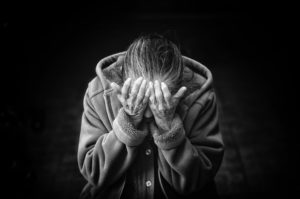
Photo by Cristian Newman on Unsplash
Frequently we don’t seek to deceive others as much as we wish to deceive ourselves. The lies we tell ourselves are perhaps the most powerful of all, and we protect those kind of lies the most ferociously.
It’s important to understand recognizing the presence of a lie does not mean we know the substance of the lie or why it’s being told. As a writer, I find that why infinitely interesting in its possibilities. What kinds of things do we conceal? What motivates us to do so? What are the consequences of our various lies, great and small, to ourselves and to others? How do our bodies unconsciously communicate our emotional deception? If we spot emotional deception in someone we’re close to, what do we do with that information? What kinds of lies are terminal in relationships, and what kinds survivable? How do we forgive ourselves and others for emotional deception?
The looming presence of social media in our culture means many of our daily interactions, perhaps most, are not face to face, which greatly diminishes the complexity and depth of human communication and makes emotional deception easy. Body language is invisible. Tone, pitch and other verbal clues and idiosyncrasies are unheard. We use sanitized little emojis to represent our meaning, or at least to represent what we want others to believe our meaning is.
Paul Ekman has written several books I’m looking forward to exploring, and one can take online classes and learn more. I intend to learn a lot more.
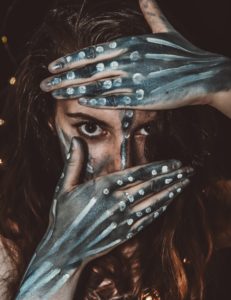
Photo by Joshua Fuller on Unsplash
All content on this site ©2018
Jennifer Rose
except where otherwise noted
by Jenny Rose | Jul 12, 2018 | Emotional Intelligence, Feelings
I’ve been thinking about loyalty recently. Loyalty is one of my bigger rabbit holes. I most often use the term when I’m beating myself up. A nasty little internal voice frequently hisses “Disloyal!” in my ear. This happens so constantly, in fact, that I’m bored. I’ve decided to unpack the concept of loyalty, spread it out, let the cat sniff at it, and either own my own disloyalty without shame or permanently silence that particular internal accusation.
The first thing I notice is I want to be loyal. Loyalty is a virtue. Good, loving people are loyal. I certainly want to be a loyal family member, friend and partner. Loyalty has always been an important part of my identity, which is why it’s such an effective lash for me. What’s more shameful and ugly than disloyalty?
I don’t want to be shameful and ugly. If I am shameful and ugly, I certainly don’t want anyone to find out.
Loyalty, then, is something that depends on what onlookers think about my behavior and choices.
Before I’ve even crawled into the mouth of the rabbit hole I’ve moved out of my power. Interesting.
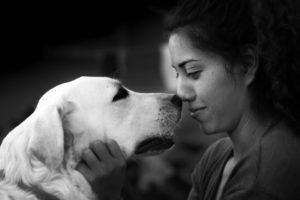
Photo by Kevin Quezada on Unsplash
Recently, I took my morning cup of tea and spent two hours with dictionary, thesaurus and my laptop looking at poetry, quotes, memes, definitions and articles. I read about families, patriotism and dogs. I discovered 80% of results returned for a search on loyalty have to do with manipulating customer and product loyalty. Of course. What a world.
At the end of that two hours, I felt no wiser. I had some notes, but I still didn’t have a clear idea of what loyalty really is, what it looks like, what it feels like to give or receive it, and how it overlaps with trust, authenticity, truth, enabling, coercion and control. I can point to people in my life I feel loyalty for, and I can point to people who I feel are loyal to me, but the truth is I don’t trust myself on this issue. Maybe my confusion means I am, in fact, shamefully disloyal. A humbling and humiliating thought.
At the same time, would I feel so torn apart by family and personal social dynamics if I was thoroughly disloyal? My sense of loyalty to others has given me much anguish over the years. Surely if it was absent in me I wouldn’t struggle so hard with it.
Simply defined, loyalty is a strong feeling of support or allegiance. That definition leaves me even more clueless than I was before. It has to be more complicated than that, doesn’t it?
Well, doesn’t it?
Is it just me, or does the cultural definition of loyalty consist of a much more convoluted hairball of expectations, assumptions and false equivalencies?
I often use back doors when I feel stuck. My two hours of research did give me some ideas about what loyalty is not, at least in my mind. But already I can see others might disagree. Still, that’s why we have dictionaries and definitions.
Loyalty cannot be slavery or prostitution. If I have to compromise my integrity in order to fulfill someone else’s expectation of loyalty, it’s no longer a virtue, but an abuse and manipulation. True loyalty must be freely and heartfully given. Authentic loyalty can’t be bought, sold, stolen or owed. It’s not demonstrated by obedience or compliance. If it’s not free and spontaneous, it’s only a sham, an empty word that sounds great but has no substance. Loyalty is not a weapon. It’s a gift.
Said another way, from a perspective of power (and you know how much I think about power!), loyalty is a tool of power-with, not a weapon of power-over.

Photo by Seth Macey on Unsplash
Loyalty is not blind. Part of its value is its clarity. We prize it so highly because seeing and being seen clearly, warts and all, and demonstrating or receiving loyalty in spite of it is an act of strength and love. In that case, compassion, tolerance and respect are all involved in loyalty. It follows, then, that loyalty does not require agreement. I can feel entirely loyal to a loved one while disagreeing with some of their choices and beliefs.
Loyalty does not imply denial, arguing with what is or colluding in rewriting history in order to sanitize it. Loyalty is not a right or an obligation.
In fact, the thesaurus suggests the word “trueness” as a synonym for loyalty. Interesting. Isn’t trueness the same as authenticity? I count on those who are loyal to me to tell me the truth of their experience with me and of me. I count on them to trust me with their thoughts, feelings, concerns and observations. I count on them to ask me questions about my choices, and to forgive me when I’m less than perfect. I hold myself to the same standards. This can mean a hard conversation now and then, and uncomfortable vulnerability and risk, but real loyalty is not cheap.
The thesaurus also supplies the word “constancy” as a synonym for loyalty. Constancy is an old-fashioned word these days, but it leapt out at me because consistency is very important to me. I’ve had some experience with Jekyll-and-Hyde abuse patterns in which the goalposts and rules constantly change without notice, keeping me nicely trapped in trying to please people who have no intention of ever being pleased no matter what I do. Loyalty is present one day and absent the next, then present again, then unavailable. That kind of “loyalty” is an abuse tactic.
As always, the construct of loyalty is two-sided. There’s the loyalty that extends between me and another, and then there’s the loyalty I extend to myself. This circles back around to slavery, prostitution and silence. If I have to betray my own needs or make myself small in order to earn or retain someone’s loyalty, something’s very wrong. If I’m called disloyal for saying no, having appropriate boundaries or telling the truth of my experience, then we are not in agreement about the definition of loyalty or I’m being manipulated (again). How loyal can I be to others if I fail to be faithful to myself?
True loyalty will never require me to make a choice between myself and another. Loyalty is strong enough to compromise and collaborate.
Loyalty becomes weaponized when we demand or command absolute agreement, devotion and unquestioning support. Then the concept becomes very black and white. This is demonstrated all over social media and media in general. One unwanted question or view leads to unmerciful deplatforming, silencing and a torrent of threats and abuse. Our loyalty is questioned and tested at every turn. We allow bullies, tyrants and personality-disordered people to achieve and maintain control, terrified of tribal shaming, being unpatriotic or being cast out of our social groups and communities.
The label of disloyalty is extremely powerful, but when I strip away all my confusions and distortions around loyalty and return to the simple definition, it’s not complicated at all. I certainly feel a strong allegiance and support for many individual people, for my community, for my country, for women, for writers, for this piece of land I live on, and for myself.
I suspect many others would like me to wear the label of disloyalty, but I can’t do a thing about their distortions except hand them a dictionary. Very elitist behavior, I’m sure you will agree. Not to mention the disloyalty of refusing to collude in my own shaming.
Being called disloyal doesn’t make it so.
That voice in my head has to do better, find a new slur. I’m willing to own being disloyal if I am, but my conclusion after this investigation is mostly I’m not, and when I am, my greatest trespass is against myself. That I can do something about.
Loyalty. Setting down the weapon. Picking up the tool.

Photo by David Beale on Unsplash
All content on this site ©2018
Jennifer Rose
except where otherwise noted
by Jenny Rose | Jul 5, 2018 | Power
“Always forgive your enemies; nothing annoys them so much.”
― Oscar Wilde
It’s been a chaotic week for me of fear, memories, fire, grief, a couple of new friends and unfinished emotional business resulting in a foul snarl of neglected feelings. Also, in common with millions of others, we are sweltering under a heavy blanket of heat and humidity and I feel about as attractive as a slime mold.
My old home place, my old community in Colorado, is burning. I’m not there. I’m glad I’m not there.
I should be there. I hate myself for not being there.
I’ve written before about blessing the ground between us. Now my mind is filled with the ground I once lived on, and all I can see are the horrifying images of flames, smoke, and the ashy remains of structures and scorched land. I spend hours every day searching the web for updates from local command and incident centers, the local papers, TV and radio and residents who post pictures and videos. I watch interviews with old friends and weep. I see video clips of my town and it’s like a ghost town, the streets empty and everything looking sere and dry because of drought. Towers of smoke loom and the air is an eerie sullen color. This should be the height of the tourist season there, the streets busy, flowers growing, and shade trees green and cool.
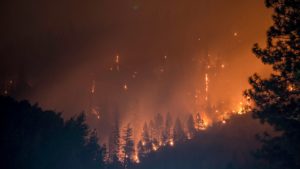
Photo by Matt Howard on Unsplash
Now there are tens of thousands of scorched acres between me and my memories of that place. I bless the ground between us. Given time and water, it will renew, but I think water is no longer a certainty and my lifetime will have run its course before the land recovers and the forests regrow. In a strange sort of way, the desolation of all that scorched earth echoes the desolation I feel as I watch nations, communities, and people become more divisive and competitive. It seems we’re getting more and more skilled all the time at scorching the ground between us, soaking it in blood and then sowing it with salt. We do not forgive differences. We carry hatred between peoples from one generation to the next, and many are at work in the world to increase the divisions by fanning the flames with rhetoric and disinformation, and pouring gasoline onto the fire in the form of resentment, ignorance, and fear.
We do not forgive. We are not forgiven.
Never have despair, powerlessness and fear seemed so darkly seductive to me as they do in these times. My experience is only an infinitesimal part of what’s happening now on Planet Earth, and I’m quite sure we have not yet descended as far as we’re going to. At times, it’s only by deliberately stoking my stubbornness and will and refusing to take my gaze away from where my power is that I continue to cling to faith in some kind of a cosmic balance and plan in spite of fear.
I’ve been spending a lot of time recently thinking about my family and dealing with some of the aforementioned unfinished business. I’ve written letters, both to the dead and to the living, some that have been sent and others that never will be. As I make new friends, I listen to what we talk about, watch how we get to know one another and feel the flowing give and take of compassion and support healthy female friendships create.
“I wondered if that was how forgiveness budded; not with the fanfare of epiphany, but with pain gathering its things, packing up, and slipping away unannounced in the middle of the night.”
― Khaled Hosseini, The Kite Runner
Over and over again, in all these places in my life, I stumble upon the theme forgiveness: The power of it; the terrible, helpless pain of feeling unforgiven; the weapon we make of it; the fear we will not be — cannot be — forgiven for whatever our particular stain or shame is. I have lately asked myself and others: Am I unforgivable? Can that be true? Can love be true without forgiveness? How do I continue to demonstrate love and connection in the face of obdurate unforgiveness? When others told me I was unforgivable, did they mean it, or am I still bleeding over something they have, in fact, forgiven?
It struck me this morning, as I lay in bed at 6:00 a.m. with the rattling roar of the window air conditioner in my ears and the damp sheet over my sweaty body, I’ve once again lost my way, been seduced by the false comfort of victimhood. I’ve been lost in the tangled maze of all those messy feelings and forgotten, temporarily, the point is not what anyone else does about forgiveness. The point is, and the power resides in, what I do with it. Furthermore, the biggest question of all is the one I haven’t been asking.
Can I, do I, will I forgive myself?
That’s where my power is.
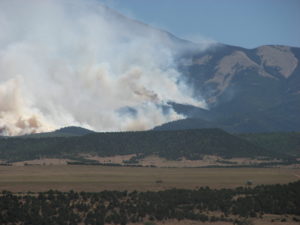
East Peak Fire, Huerfano County, CO 2013
Can I forgive myself for living in this lovely green, lush, landscape where we do still have water? Can I forgive myself for reading the signs of what was to come in the long, unending drought and fires in my old place and leaving before I was forced out by climate change and fire? Can I forgive myself for the mother, daughter and sister I was and am? Can I forgive myself for loving, trusting, hoping, believing, trying, accommodating, pleasing and failing? Can I forgive myself for all the years of neglect, silencing and abuse I colluded with and perpetrated toward myself? Can I forgive myself for now recognizing and responding to my own feelings and needs first? Can I forgive myself for writing or speaking the simple truth?
Forgiveness is a slippery concept, like tolerance. I don’t think of forgiving as forgetting. I’d be foolish to forget what I’ve learned as I interact with others. I’ll cripple myself if I don’t forgive. For me, forgiveness is an integral part of loving. Forgetting is not. Nor do I equate forgiveness with trust. Trust can be lost and rebuilt, but it takes time. Trust depends on forgiveness, but forgiveness doesn’t necessarily include trust.
I’m not at all sure we can create a better world together without forgiveness. I’m quite sure we won’t forgive one another if we’re unable to forgive ourselves. As resources shrink, we’re going to be forced onto a more level playing field in terms of our standard of living. Some of us have a lot more to lose than others. The have-nots are filled with rage. The haves are filled with fear.

Photo by Evan Kirby on Unsplash
There will be a lot to learn in the years ahead. I might as well start now to work with forgiveness, to befriend it, to embrace it, and to talk about it. Forgiving and letting go are both easier for me to do externally than internally, but internal work is the one place where we all have equal power. That’s where it must begin. We’re going to need our power, and we’re going to need to manage it well in order to survive. When our houses, businesses, cars and stuff disappear in fire, storm and flood, when our arable land becomes too hot to grow food, when no water comes from the tap and when money no longer allows us to pretend it’s not all happening, then we will rediscover what true power is, and then perhaps we can begin to bless the ground between us, forgive what has come before, and find new ways to collaborate and cooperate with the living system we call Earth.
In the meantime, I think I’ll stop begging others for forgiveness and concentrate on the places where I have power. Others may think of me as unforgivable, but I needn’t agree, and no one can prevent me from forgiving another.
“The weak can never forgive. Forgiveness is the attribute of the strong.”
― Mahatma Gandhi, All Men are Brothers: Autobiographical Reflections
My road to self-forgiveness may be long. It’s hard to take back the power of forgiveness, because now I have to be responsible for granting or withholding it. In some ways, it’s easier to beg others for it. If it’s not forthcoming from others, well, it’s not my fault. The path of self-forgiveness, though, is all up to me. It will be interesting to discover what sort of shame, guilt and self-loathing lurk in my internal terrain. It will be interesting to challenge the power of what others think and navigate by my own stars and compass. It will be interesting to put out fires on my side and observe whether others are invested in keeping them smoldering or assist in quenching them so the ground between us can heal.
Here’s a poem by Wendell Berry mapping the journey of self-forgiveness. It’s a good map. I’m taking it with me.
Do Not Be Ashamed
You will be walking some night
in the comfortable dark of your yard
and suddenly a great light will shine
round about you, and behind you
will be a wall you never saw before.
It will be clear to you suddenly
that you were about to escape,
and that you are guilty: you misread
the complex instructions, you are not
a member, you lost your card
or never had one. And you will know
that they have been there all along,
their eyes on your letters and books,
their hands in your pockets,
their ears wired to your bed.
Though you have done nothing shameful,
they will want you to be ashamed.
They will want you to kneel and weep
and say you should have been like them.
And once you say you are ashamed,
reading the page they hold out to you,
then such light as you have made
in your history will leave you.
They will no longer need to pursue you.
You will pursue them, begging forgiveness.
They will not forgive you.
There is no power against them.
It is only candor that is aloof from them,
only an inward clarity, unashamed,
that they cannot reach. Be ready.
When their light has picked you out
and their questions are asked, say to them:
“I am not ashamed.” A sure horizon
will come around you. The heron will begin
his evening flight from the hilltop.

Photo by Yuan Yue on Unsplash
All content on this site ©2018
Jennifer Rose
except where otherwise noted
by Jenny Rose | Apr 11, 2018 | Power
I’ve written before about two positions of power: Power-over (maintaining or creating power inequality) and power-with (maintaining equal power). I’ve thought of this as a complete dichotomy, an either/or lens through which I look at all interactions and relationships, both mine and those around me. Lately, though, I’ve seen two other dimensions in the way we manage power. We are agents of power enhancement or power degradation.
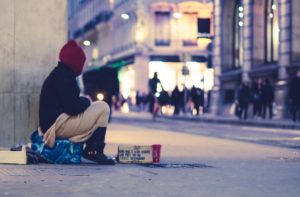
Photo by Ev on Unsplash
Power enhancement and power degradation are the states between power-over and power-with. If we seek to steal the power of others, we begin by sabotaging cooperation, negotiation and equal access to resources — all those things that create communities based in power-with. If our sabotage is successful, power degradation begins. We don’t have complete power-over, not yet, but we are beginning to break down independence, self-sufficiency and the boundaries of others. We are actively working behind the scenes, slowly and subtly corrupting power wherever we can. We might, at this point, have a change of heart and begin fostering behaviors and situations that recreate and enhance power-with, or we might continue with our goal of power-over. Once our goal is attained, we can cease to lurk in the shadows (or under our sheepskin) and come into the spotlight, flushed and triumphant, bloated with stolen power and proud of it.
On the other hand, if we seek to empower others who have been embedded in a power-over dynamic, we begin by managing our own power in such a way that we enhance the power of the disempowered and degrade the power of those maintaining or creating a power-over status quo. Ideally, we don’t give our power away, because that’s a finite resource and leads to burnout and exhaustion. A better way is to use our power to teach, to lead, to support, to legislate and to generally become the wind beneath someone else’s wings. In other words, we appropriately invest our power into teaching others how to discover, reclaim, maintain and manage their own.
An abused child or woman is not going to know how to take care of themselves and function, even if their abuser is magically whisked away. They have to learn. Actually, first they have to unlearn what they already know — all the coping mechanisms that kept them alive in their situation but won’t work well in the wider world — and then they have to learn new skills and behaviors. That takes time, appropriate support from power enhancers and protection from power degraders, at least temporarily, while the victims of power-over learn how to find and reclaim their own power.
The people who live and embody these two intermediate positions of power, enhancers and degraders, are my people — the caregivers. We are the parents and the teachers; the mentors, spiritual leaders, coaches, medical professionals and volunteers who work at shelters, missions, soup kitchens, and out of tents in far-flung places. Interestingly, most of these folks once came from the exterminated middle class. Also interestingly, we see frequent headlines about how some people in this group misuse their position of power and authority in the guise of “helping” others. Shielded by the mask of a power enhancer, they act as power degraders, abusing and exploiting others unchecked, sometimes for decades.

Photo by Cristian Newman on Unsplash
Power enhancement and degradation are not black/white good/bad positions. Many grassroots organizations seek to degrade power in an effort to address our power-over culture and help others reclaim their rightful power. You might say their agenda is to equalize power. The Southern Poverty Law Center is an excellent example. As parents, we might hope to work as power enhancers for our children. As resistance volunteers, we might work against organizations supporting inequality.
It’s important to note our culture doesn’t financially support people in these positions of power particularly well. Teachers strike for better pay. Coaches lay down their lives in bullet-riddled school hallways. Nurses and doctors are vulnerable to addiction, burnout and fractured relationships. Ditto police and firefighters. Compassion fatigue is epidemic. None of these people are millionaires, and some are becoming homeless in places like California as the cost of housing skyrockets. I also note how many of these positions are filled by volunteers. I myself did volunteer fire and rescue work for years, and then animal rescue work and hospice. Red Cross depends on its volunteers. Many healthcare facilities and schools rely heavily on volunteers, as well as sports teams, churches and countless human rights organizations.
Yet it seems to me power enhancers and power degraders are the most important people in our communities. They have the ability to lift others up into integrity and excellence or destroy them. They shape our health, the way we learn and think (or not, sadly), and our spiritual wellness. We trust them with our children, our souls, our secrets and our lives. When they stumble, burn out, fail or waver, we roar with fury, demand justice and retribution, riot and demonstrate, never considering we are the ones who put them in such dangerous, risky, heartbreaking and impossible positions in the first place. We place them on the front lines, put them under constant public scrutiny and pressure and make them responsible for understanding and fixing our increasingly unequal and dysfunctional social power dynamics.
Consider what a professional athlete gets paid, or an entertainer, or a “successful” politician. Compare that to what your children’s teachers are paid, or your local police or fire people, or your nurse practioner or the local softball coach or scout leader. Who has more direct influence in your life and well-being? Who will come help you in the middle of the night, organize community support or assist you with wedding or funeral arrangements?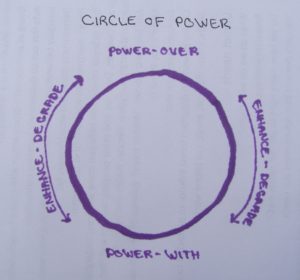
Here is a graphic demonstrating the circle of power. (Please take a moment to notice the cutting-edge high tech used to generate this graphic. Impressive, yes?) Currently, a power-over dynamic is running the show, and it lies directly across the circle from power-with. We each occupy a place or places along the circle of power, and those places are dynamic and fluid, depending on the daily and even hourly choices we make. Some people spend most of their lives trying to equalize power between people while others work tirelessly to create and maintain unequal power. We all, whether consciously or not, behave in ways that degrade or enhance our own power and the power of others.

Photo by whoislimos on Unsplash
Nobody teaches us about power. Not our parents or schools, and certainly not the media. Yet our inherent rightful power and our need to manage it appropriately and effectively transcends ability level, age, race, sex or socioeconomics. Individual power is apolitical. We all can take the same class, if only we can find teachers.
The problem is, there is no class and our best teachers are exhausted, demoralized, underpaid, underappreciated, overworked and drowning in a crippled education system while others are busy exploiting their positions in order to degrade the power of their students and colleagues. Even if some of the former know something about power management, they’re not in a position to teach anyone else about it. Power management and emotional intelligence skills (which are inextricably intertwined) are not going to show up on a standardized test or entrance exam.
We don’t know how to manage and maintain our power. We haven’t learned it and we can’t teach it. Yet we expect those people who support, protect and serve our communities, all those people who take intermediate roles of power enhancers and degraders, to remain uncorrupted and infallible and spotlessly kind, compassionate, moral, ethical, and just plain GOOD. We give them power and authority blindly, because we can’t recognize appropriate power management from inappropriate either, and expect them to figure it out and do the right thing. We sure as hell don’t know what to do! When that doesn’t happen, we’re angry and we look around for someone to blame, someone or something to scapegoat.
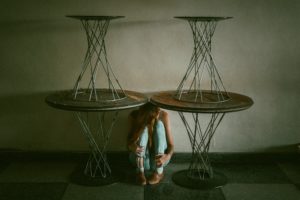
Photo by Talles Alves on Unsplash
How can we expect things to get better if we don’t make some changes?
I suggest we must begin at the beginning, at the foundations, with our children, which means a new paradigm of parenting. Every single adult coming into meaningful contact with a child must be reeducated about the continuum concept and connection parenting. Children need appropriate connection and bonding throughout childhood. If that happens, they learn emotional intelligence and become secure, confident, curious, joyful people who practice power-with as a matter of course, because their own power has never been corrupted or coerced.
How do we freeze everyone in their tracks, wipe their data banks clean and overwrite with better information? How can meaningful change take place if we don’t?
Don’t ask me. I can think about it and write about it, but I have no idea how to tackle such an overwhelmingly impossible task, even if everyone would consent to it, and most won’t. They don’t want to give up whatever power they feel they do have, even if it’s just over their children.
In the meantime, there’s only this small attic room; a grey, chilly spring day outside; and whatever I do or don’t do with my portion of personal power this minute, this hour, this day. I will make choices to enhance or degrade the power of everyone I interact with, including myself. I’ll write, go swimming and pick up birdseed for our empty feeders. I’ll observe others, think about power and try to make mindful choices.
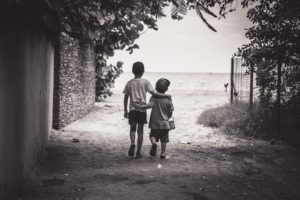
Photo by juan pablo rodriguez on Unsplash
All content on this site ©2018
Jennifer Rose
except where otherwise noted
by Jenny Rose | Nov 9, 2017 | Connection & Community, Emotional Intelligence, Shadows
It’s hunting season in Maine. Several days ago a woman was accidentally shot and killed on her own property at 10:30 in the morning by a hunter. We frequently hear shots in the neighborhood, and although we don’t allow hunting on our land, there’s nothing to prevent a hunter wandering in, attracted by the deer, game birds and waterfowl on our 26 acres.
I bought a cheap orange vest I can wear over my coat for my morning walks.
Wearing orange during hunting season is such a simple and obvious safety tactic that I didn’t think twice about doing it, but the first morning I went out with the vest on I discovered a lot of complex feelings about being so visible in the world.
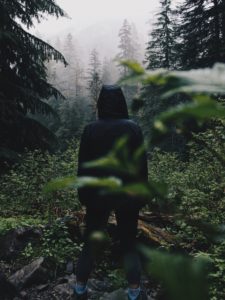
Photo by Andrew Spencer on Unsplash
The first thing I noted was how dangerously exposed I felt. I do not want to be seen by human eyes. I don’t mind if the wildlife sees me, but if they do I’m less likely to see them, so I do my best to move quietly and unobtrusively through the landscape, wearing neutral, natural colors. I stop and sit or lean against a tree for long stretches, hardly moving, watching the river and listening to the woods around me.
The orange vest shrieks, “Look at me! I’m here!” and I hate it. It’s more than just my preference to blend in to backgrounds and maintain protective camouflage. It seems a life-and-death necessity to avoid being seen.
I’ve been aware of my hypervigilance for some time now. I’ve never been comfortable in crowds. If I’m not able to position myself in a corner or with my back to something solid and watch, listen and evaluate, anxiety quickly disables me. I need to know where the exits are in any indoor space.
This is interesting, as I’m fascinated by people, and people watching is one of my favorite activities. I’ve frequently longed to be invisible, to watch and listen freely and leave no trace of my presence. If I could be invisible, I imagine I’d still get overstimulated by noise, activity and technologically-generated energy, but I’d feel safer.
The strength of my feelings as I donned the orange vest begged the question: What happens if somebody sees me? What’s so terrible?
That’s easy. Criticism happens. Judgement, abuse (verbal, emotional, physical), negative feedback happen. If I’m seen doing anything, I’m sure to be doing it wrong (according to the observer, anyway). I’m sure to disappoint. I’m sure to be inadequate or inappropriate. My clothes are wrong. I’m clearly behaving like a slut, going out on my own land in my men’s Carhartt jeans and old boots. My hair is wrong. My choices are wrong. If I’m heading for the northern boundary of our land, I should be walking the southern border. I’m too noisy. I’m in someone’s way. I’m too slow. I’m wasting my time and should be doing something more productive. I’m irresponsible. I’m lazy. I’m selfish. I’m scaring the fish. I’m scaring the birds. I’m scaring the animals. I should be ashamed of myself.
Wow. No wonder I don’t want to be seen. Who knew the perils?
I didn’t know, until my ugly orange vest dredged all this up from my swampy subconscious.
On subsequent mornings, as I’ve walked in my orange vest, I’ve thought about the tension between being seen and avoiding being seen. How can anyone be in the world without being seen, even the most self-effacing of us? Refusing to be seen is refusing any healthy human connection. How do we get hired without being seen, or accepted for college? How do we follow our creativity or passion if we’re afraid to be seen? How do we engage in face-to-face conversation or discussion, or participate in politics or as a volunteer?

Photo by Peter Forster on Unsplash
On the other hand, how much exposure is too much? How can we avoid being seen by the shooter at the concert, in church or in the movie theater? We seem to be gradually becoming more and more captive to the Matrix, which makes us increasingly vulnerable to identity theft, technological sabotage and cyber-based terrorism.
I sometimes feel I carry protecting my privacy too far. I can’t say I regret not being on Facebook and other social media, as I’ve yet to hear about anything there that I need. On the other hand, not having a cell phone in today’s world creates a lot of problems for me. My personal issues with being seen are in the context of much wider social issues about exposure and safety. I don’t have any answers for the wider social problems. I wish I did.
For myself, though, it’s clear I need to address some of my subconscious beliefs about what will inevitably happen if I am seen. I’ve also developed a thicker skin about being criticized and judged. At this point in my life I’m really not much interested in the criticism and judgement of others. What interests me is how I feel about myself. My list of terrors about what happens if I’m seen is decades out of date, and I’ve already survived those consequences many times over. More of the same is boring rather than terrifying.
I’m stuck with my orange vest for several more weeks, and that’s OK. I’ve come to terms with it. In fact, I’m grateful to it, because it exposed some old wounds that needed attention. I’m stepping into plain sight In many ways in my life, this blog being one of the most prominent and challenging. Now I’ll practice walking this land in plain sight as well.
All content on this site ©2017
Jennifer Rose
except where otherwise noted


















